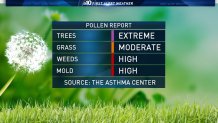If your seasonal allergies are driving you nuts, there’s a good reason behind it.
The Asthma Center, which has two main pollen observation locations in the Delaware Valley (Center City, Philadelphia and Mt Laurel, NJ), is reporting that they’ve measured “extreme” amounts of tree pollen in the air for the fourth consecutive day in a row.

The culprit of the “extreme” tree pollen counts are Oak and Mulberry trees.
The various types of trees usually have pollination intervals that last two to three weeks.
As of Thursday, Philadelphia is experiencing its second warmest April on record, with the monthly temperature running six degrees above average. This is certainly helping the tree pollen flourish.
Pollen season runs from March through October in the Delaware Valley with April and early May being the worst period for tree & grass pollen.
Most weeds and ragweed are common during the late summer and early fall.
Some simple steps to help alleviate allergy symptoms include washing your face frequently, closing your car and home windows, and washing your clothing and bed sheets frequently. Limit your time outside. If symptoms continue to be bad, allergy medication and or shots may be recommended by your doctor.
Rain showers and thunderstorms should help flush some of the tree pollen out of the air Friday, but the mold count will likely continue to be high with the damp conditions.

